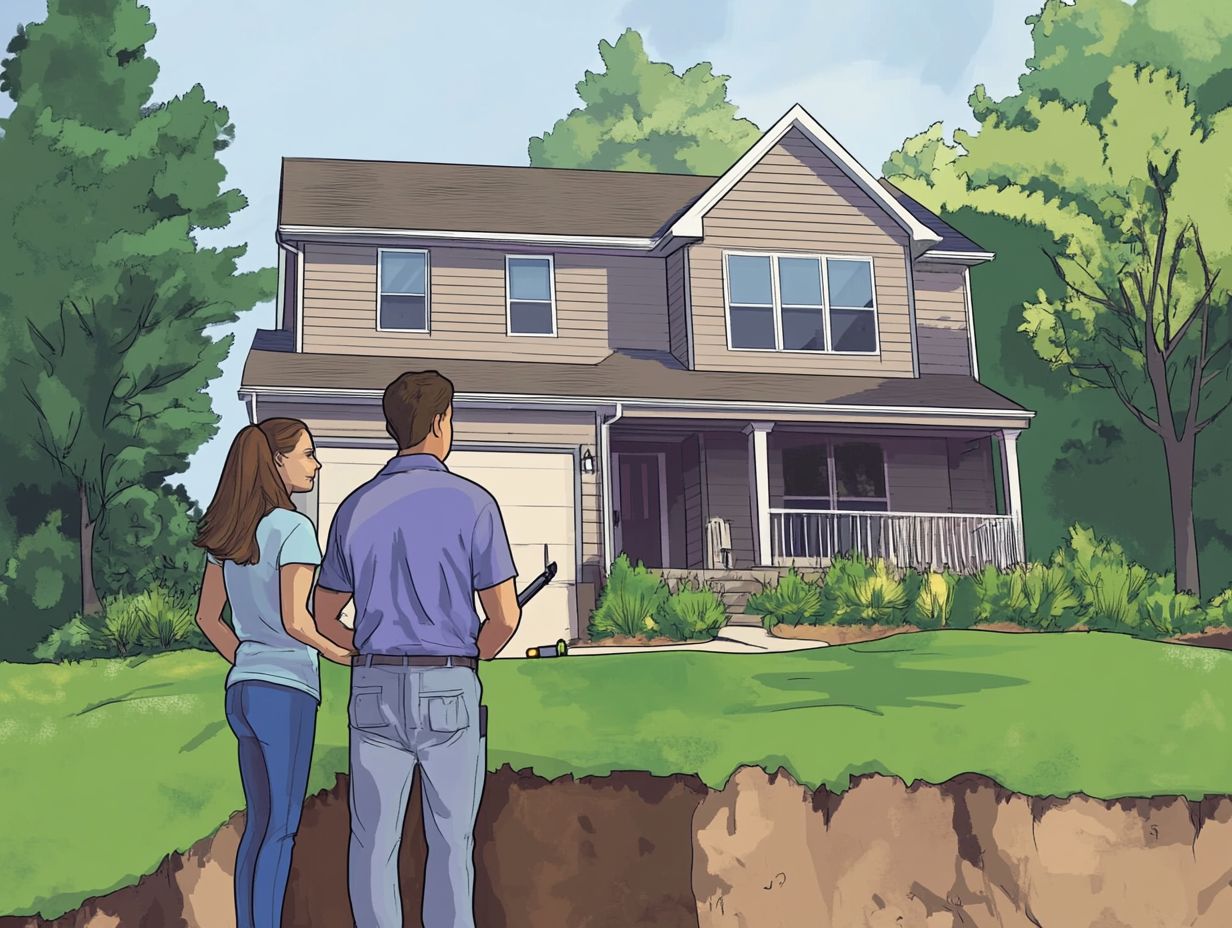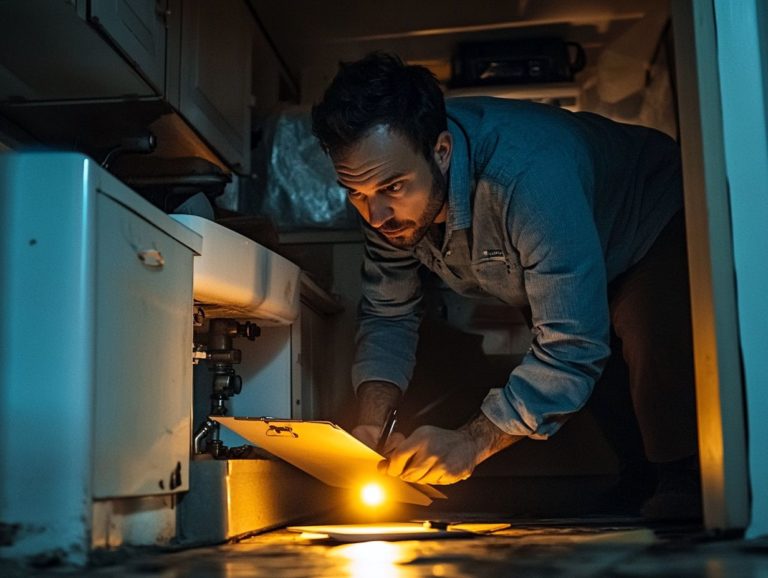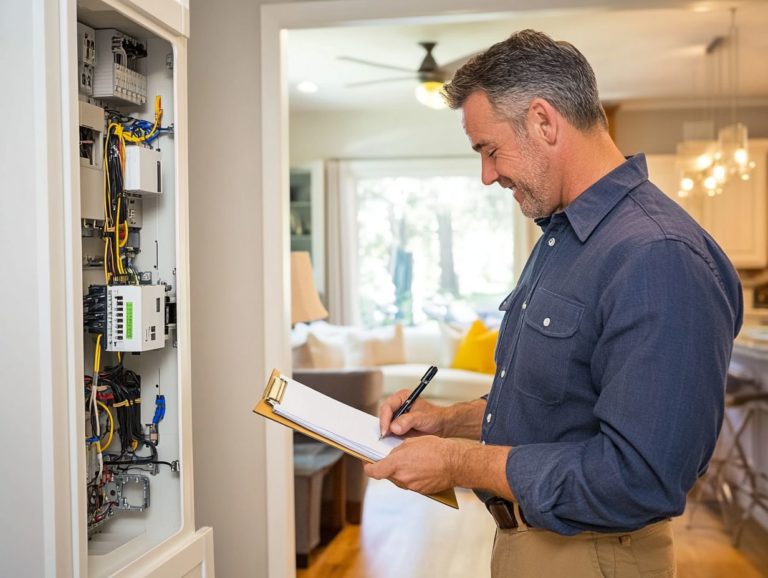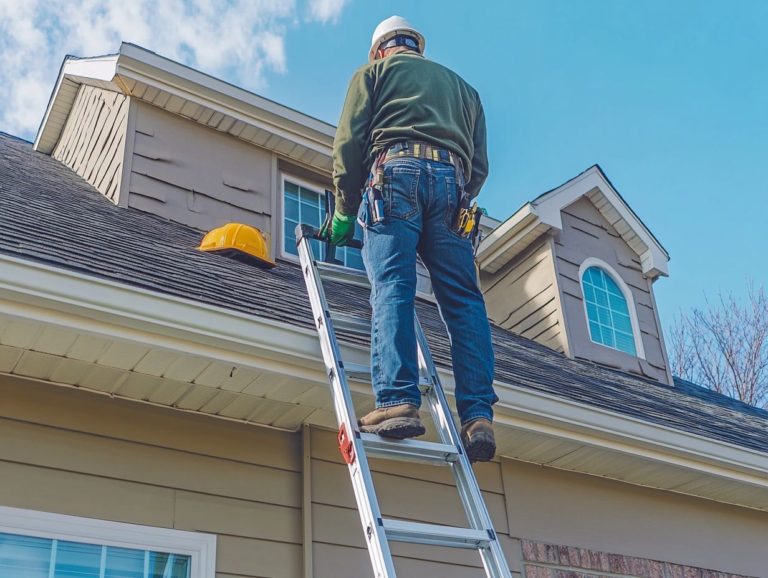The Role of Home Inspections in Home Sales
Stepping into the realm of buying or selling a home? Understanding the significance of home inspections is absolutely vital!
This article explores what home inspections involve, their importance for both buyers and sellers, and what to expect throughout the process.
It addresses typical issues that may arise, offers preparation tips, and examines how inspections can influence negotiations.
Whether you re a first-time buyer or a seasoned seller, this guide equips you with the essential knowledge needed to navigate the home inspection landscape with confidence.
Contents
- Key Takeaways:
- What is a Home Inspection?
- Why are Home Inspections Important?
- What to Expect During a Home Inspection
- Common Issues Found During Home Inspections
- How to Prepare for a Home Inspection
- How Home Inspections Affect the Sale of a Home
- Frequently Asked Questions
- Preguntas Frecuentes
- Cu l es el papel de las inspecciones de viviendas en las ventas de casas?
- Qui n es responsable de programar y pagar por una inspecci n de vivienda?
- Qu cubre t picamente una inspecci n de vivienda?
- Puede una inspecci n de vivienda afectar la venta de una casa?
- Se requiere una inspecci n de vivienda para la venta de una casa?
- Qui n realiza una inspecci n de vivienda y cu nto tiempo suele tardar?
Key Takeaways:

Home inspections are a crucial step in the home buying and selling process, providing a detailed assessment of a property’s condition and potential issues.
For buyers, a home inspection reveals potential problems and helps negotiate repairs or a lower price. For sellers, understanding the value of home inspections for real estate agents highlights areas for improvement and can potentially increase their home’s value.
To prepare for a home inspection, sellers should address any known issues, and buyers should attend the inspection and ask questions. Effective communication and negotiation based on the inspection report are essential for both parties.
What is a Home Inspection?
A home inspection is an extensive evaluation of a property conducted by a qualified inspector. It assesses the home s condition and uncovers any potential safety concerns before finalizing a sale.
This vital step in the real estate process safeguards both sellers and buyers, emphasizing the necessity of home inspections to produce a comprehensive inspection report that details the home’s current status and essential repairs that could affect its value.
Definition and Purpose
A home inspection is a thorough evaluation designed to identify safety concerns and necessary repairs, all meticulously detailed in a comprehensive report.
This isn t just a routine check; it s a vital assessment of the property s overall condition, offering insights that hold immense value for both buyers and sellers.
As a buyer, the home inspection report serves as a crucial tool, illuminating potential red flags. It gives you the power to make informed decisions and negotiate repairs or price adjustments confidently.
As a seller, being aware of existing issues beforehand allows you to address concerns before listing your property, ultimately enhancing its market appeal.
Ultimately, the clarity gained from a well-executed home inspection streamlines the transaction process, ensuring that both you and the other party can proceed with assurance and peace of mind.
Why are Home Inspections Important?
Home inspections are a game-changer in real estate! They provide a wealth of advantages for both sellers and buyers, including understanding the role of home inspectors, facilitating a smoother transaction experience.
Inspections empower buyers to uncover safety concerns or essential repairs, which can significantly affect negotiation strategies and the closing process. Understanding the role of home inspections in new construction ultimately influences the home’s overall value.
Benefits for Buyers and Sellers
Home inspections offer invaluable benefits for both buyers and sellers, empowering you to make informed decisions that can elevate your home’s value and refine your negotiation tactics, especially when understanding the importance of home inspections.
For buyers, inspections reveal hidden issues like problems with the building’s structure, faulty wiring, or plumbing headaches that may lead to costly repairs later on. By uncovering these concerns early, you can craft more strategic offers and negotiate repairs or price reductions before sealing the deal.
For sellers, getting an inspection done early can spotlight areas needing attention. Addressing issues beforehand not only enhances your property’s appeal but also increases the chances of a smoother transaction.
This proactive approach boosts buyer confidence and can ultimately lead to a higher selling price.
Don’t wait get your home inspected today!
What to Expect During a Home Inspection

During a home inspection, expect a detailed evaluation of the property. A thorough checklist will guide this process.
Inspectors will examine the electrical system, plumbing, structural integrity, and check for pests. The entire process takes several hours. You will receive a detailed report on the property s condition.
Process and Timeline
Home inspections take two to four hours for a thorough evaluation. Inspectors use a checklist to cover all essential areas.
During this time, the inspector reviews various aspects, including structural integrity and plumbing. This assessment gives buyers and sellers vital insights into the home s condition.
Sellers should prepare by clearing access to key areas, like attics and basements. This improves efficiency and streamlines the inspection.
After the assessment, the inspector reviews critical issues. These findings can influence negotiations and repair decisions.
Common Issues Found During Home Inspections
Home inspections often reveal common issues, from minor concerns to major problems. You might find electrical malfunctions, plumbing issues, or structural concerns. Recognizing these is crucial, as they affect the inspection report and negotiations.
Understanding these issues helps you navigate the real estate market confidently.
Identifying Major and Minor Problems
Identifying major and minor issues during an inspection is essential. This allows you to prioritize safety concerns and repairs that affect your investment.
Major problems, like a compromised foundation, affect property value significantly. Minor issues, such as worn paint, are simple fixes that can wait until after purchase.
Recognizing these differences shapes your inspection report and aids in negotiations. Use major problems to negotiate a lower price or request repairs before finalizing the sale.
How to Prepare for a Home Inspection
Preparing for a home inspection involves several essential steps. These ensure a smooth experience for sellers and buyers.
As a seller, focus on maintenance tasks to enhance your property s condition. This showcases your home effectively.
Buyers should arrive with a list of concerns. Discussing these with the inspector can greatly influence the inspection outcome.
This proactive approach fosters clarity and helps you make informed decisions moving forward.
Tips for Sellers and Buyers

To prepare effectively for a home inspection, tackle essential maintenance tasks if you re selling. If you re buying, create a specific list of areas you want the inspector to address.
Taking action now makes your property look its best! This proactive approach grants you peace of mind.
As a seller, enhancing your property’s appeal means ensuring that all visible maintenance issues are either resolved or disclosed upfront. Simple actions like cleaning out the gutters, checking for leaks, and verifying that all appliances are in working order can truly make a significant difference.
As a buyer, prioritize your concerns. Focus on key aspects like plumbing, electrical systems, and the condition of the roof. By being thorough in your preparations, you can make the inspection process easier and secure more favorable outcomes during negotiations.
How Home Inspections Affect the Sale of a Home
Home inspections play an important role in the sale of a property, offering buyers essential insights that can influence negotiations around necessary repairs and potential price adjustments, as detailed in the role of home inspections in real estate transactions.
The results of the home inspection can trigger a condition that allows you to rethink the deal and empower both you and the seller to reevaluate the home’s value as you navigate the closing process.
Negotiating Repairs and Price Adjustments
Negotiating repairs and price adjustments after a home inspection can feel like walking a tightrope. It requires clear communication and a full understanding of the inspection results. Adopt a strategic mindset during this phase.
Leverage the inspection report as a powerful tool to support your requests for repairs or price adjustments. Highlight specific issues flagged during the inspection. If you re the seller, use the report to engage in open discussions. Show that you re willing to address significant concerns while also protecting your interests.
By focusing on finding common ground and fostering a spirit of compromise, you can create an atmosphere of collaboration. This conversation eases tensions and paves the way for a successful transaction for all.
Frequently Asked Questions
What is the role of home inspections in home sales?
The role of home inspections in real estate is to provide potential buyers with a comprehensive evaluation of the property’s condition. This allows buyers to make informed decisions about the purchase and negotiate necessary repairs or price adjustments.
Who is responsible for scheduling and paying for a home inspection?

Normally, the buyer schedules and pays for the inspection. However, it s not uncommon for sellers to schedule and pay for an inspection before listing their home to identify any potential issues that may arise during negotiations.
What does a typical home inspection cover?
A standard home inspection covers the main components of a house, such as the structure, roof, plumbing, electrical systems, HVAC, and appliances. Additional services, like termite inspections or radon testing, may also be included depending on the property’s location and age.
Can a home inspection affect the sale of a house?
Yes, a home inspection can definitely affect the sale of a house. If significant problems are discovered during the inspection, it may lead the buyer to withdraw from the sale or request repairs or a reduction in the sale price. Conversely, a favorable inspection report can provide peace of mind to buyers and increase their confidence in the purchase.
Preguntas Frecuentes
Cu l es el papel de las inspecciones de viviendas en las ventas de casas?
El papel de las inspecciones de viviendas en las ventas de casas es proporcionar a los compradores potenciales una evaluaci n integral de la condici n de la propiedad. Esto permite a los compradores tomar decisiones informadas sobre la compra y negociar reparaciones necesarias o ajustes al precio de venta.
Qui n es responsable de programar y pagar por una inspecci n de vivienda?
Normalmente, el comprador programa y paga la inspecci n. Sin embargo, no es raro que los vendedores programen y paguen por una inspecci n antes de listar su casa para identificar problemas potenciales que puedan surgir durante las negociaciones.
Qu cubre t picamente una inspecci n de vivienda?
Una inspecci n de vivienda est ndar cubre los componentes principales de una casa, como la estructura, el techo, la plomer a, la electricidad, el HVAC y los electrodom sticos. Tambi n puede incluir servicios adicionales, como inspecciones de termitas o pruebas de rad n, dependiendo de la ubicaci n y la edad de la propiedad.
Puede una inspecci n de vivienda afectar la venta de una casa?
S , una inspecci n de vivienda puede afectar definitivamente la venta de una casa. Si se descubren problemas importantes durante la inspecci n, puede hacer que el comprador se retire de la venta o solicite reparaciones o una reducci n en el precio de venta. Sin embargo, si el informe de inspecci n es favorable, puede brindar tranquilidad a los compradores y aumentar su confianza en la compra.
Se requiere una inspecci n de vivienda para la venta de una casa?
En la mayor a de los casos, no se requiere una inspecci n de vivienda para la venta de una casa.
Sin embargo, es muy til que tanto compradores como vendedores realicen una inspecci n exhaustiva para evitar sorpresas o disputas.
En algunos estados, se requiere una inspecci n de vivienda como parte del contrato de bienes ra ces.
Qui n realiza una inspecci n de vivienda y cu nto tiempo suele tardar?
Un inspector cualificado har un chequeo de tu casa para asegurarse de que todo est en orden.
Generalmente, esto toma entre 2 y 3 horas. Te entregar un informe claro sobre lo que encontr , normalmente en 24 a 48 horas.






